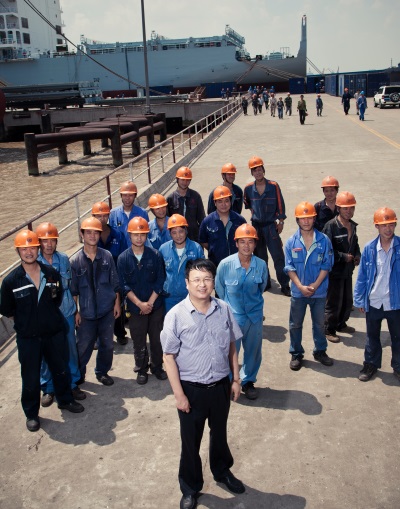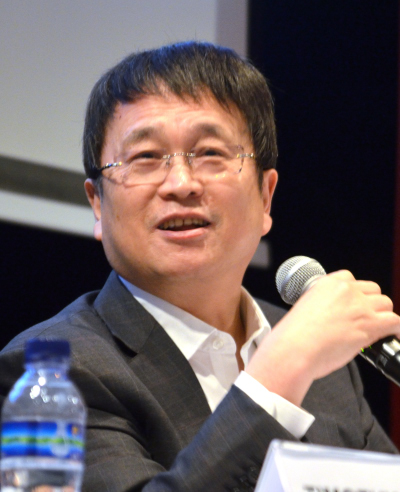 This article, written by Jennifer Tan (left, Director, Research & Products, Equities & Fixed Income, at the Singapore Exchange), originally was published in SGX's kopi-C: the Company brew series. The article is republished here with permission.
This article, written by Jennifer Tan (left, Director, Research & Products, Equities & Fixed Income, at the Singapore Exchange), originally was published in SGX's kopi-C: the Company brew series. The article is republished here with permission.
 Executive Chairman Ren Yuan Lin (pictured in the foreground) with workers at Yangzijiang shipyard. Photo: Company Executive Chairman Ren Yuan Lin (pictured in the foreground) with workers at Yangzijiang shipyard. Photo: Company
Ren Yuanlin knows all too well what it means to survive the odds, having grown up amidst the chaos and violence of China’s Great Cultural Revolution in the 1960s and 70s.
The Executive Chairman of Yangzijiang Shipbuilding (Holdings) Ltd, China’s largest privately owned shipyard, was sent to the countryside at the age of 14 to do hard labour under Mao Zedong’s rustification campaign – the infamous “Down to the Countryside” movement.
Ren was among more than 17 million Chinese high school graduates forced out of cities and exiled to remote areas to live and work among peasants, so they could renounce their bourgeois ideas.
“Because we were on the lowest rung of society, we felt the oppression very keenly. We were looked down upon – it was just like being the lowest class in the Indian caste system,” he said in Mandarin.
|
“At that time, the key issue was survival, and surviving better than those around you. So for each task that I was given, I made sure I did it well, and did it better than the others.”
- Ren Yuan Lin
Yangzijiang Executive Chairman
|
Ren’s family was further fractured when his father committed suicide after his property and business were confiscated during the Cultural Revolution by the Red Guards, paramilitary youths unleashed by Mao to enforce communist dogma and purge the nation of capitalist elements.
“I learnt to be very independent at an early age, and to work very hard. At that time, we had few options – we could not make our own decisions, and all we could do was to maximise every opportunity that came our way,” said the youngest in a family of five brothers and a sister.
|
The government assigned Ren to work in Jiangyin Shipbuilding Factory, a state-owned company engaged in constructing wooden vessels, in the 1970s. In the mid-1980s, the company was renamed Jiangsu Yangzijiang Shipbuilding Factory.
“Shipbuilding is not my passion or my pursuit. That was the government’s decision. But as long as I am here, I will do the job well,” he added.
And Ren, 62, has done just that.
Born in Jiangyin, Jiangsu province, he proved to be a shrewd businessman, taking Yangzijiang through various milestones, including the company’s privatisation via a management buyout in 1999, as well as listings on the Singapore and Taiwan stock exchanges in 2007 and 2010 respectively. In September, Yangzijiang was included a second time as a constituent in Singapore’s benchmark Straits Times Index.
|
Yangzijiang Shipbuilding
|
|
Stock Price
|
87c
|
|
Market Cap
|
S$3.4 billion
|
|
52-week high low
|
86.5c-S$1.27
|
|
Dividend Yield
|
4.9%
|
|
PE ratio
|
7.5x
|
|
Source: SGX StockFacts (data as of 5 Aug 2016)
|
The Diploma holder in Economics from Jiangsu Television Broadcasting University also successfully steered the company through a protracted industry slump, maintaining profits in the face of a severe capacity glut.
Yangzijiang, whose diversified product portfolio includes large containerships and bulk carriers, averaged revenues of 14.8 billion yuan and earnings of 3.42 billion yuan between 2010 and 2014.
Now, China’s third-largest yard by capacity and the nation’s most profitable shipbuilder still holds a healthy order book of US$4.8 billion despite the downturn. This backlog of 107 vessels is expected to keep its yards busy until 2018.
BlackRock, the world’s largest investment manager with US$4.5 trillion assets under management, raised its stake in Yangzijiang to 5% from 4.99% in April, making it the company’s biggest institutional shareholder.
| ♦ A Long Winter |
|
Meanwhile, the number of shipyards in China have shrunk to about 300 currently, from 3,000 over the past five years. This number may fall below 50 in another three years, Ren said.
The global commodities slump and weaker shipping demand has decimated orders for new vessels, resulting in several Chinese shipyards filing for restructuring or declaring bankruptcy this year.
Others, like the two largest state-owned shipbuilders – China State Shipbuilding Corp (CSSC) and China Shipbuilding Industry Corp (CSIC) – are considering a merger.
One-time peer China Huarong Energy – previously called Rongsheng Heavy Industries Group Holdings – has also struggled with losses and debts. Yangzijiang was approached by the government in March to explore the possibility of acquiring a stake in Rongsheng, but no decision has been made yet.
|
 “It’s going to be a very long winter. The industry may take another three to five years to recover, with 80% of players likely to go bust. “It’s going to be a very long winter. The industry may take another three to five years to recover, with 80% of players likely to go bust.
“The question is how do you handle the challenges and make use of the opportunities that emerge during this period.”
- Ren Yuan Lin
Yangzijiang Executive Chairman
(NextInsight file photo)
|
The company plans to boost sales and marketing efforts to ensure an expanding order book, while enhancing R&D initiatives by partnering research institutes. It will focus on the niche markets of ultra-large containerships and clean energy vessels, as well as building better vessels that offer higher loading, lower fuel consumption and reduced emissions, Ren said.
And one advantage that will ensure Yangzijiang’s survival is its cost structure.
“Our cost is about five percent lower than our Chinese peers, because we are a private shipyard, not a state-owned enterprise. We have a stringent planning and construction process, flat management structure and lower procurement costs.”
The bottom line is that the industry’s competitive dynamics need to be adjusted, he added.
“China needs to withdraw protection and support for state-owned enterprises in the sector. The same goes for Korea. If both governments continue to protect their state-owned companies, which are the most irrational players in the market, the excess capacity will never be removed.”
On hindsight, Yangzijiang’s switch to 10,000 twenty-foot-equivalent (TEU) containerships from smaller vessels was a smart move, Ren said.
“This is now our flagship product, and because it’s considered a high-end, sophisticated vessel, it has enhanced our profile in the market and helped define our fortunes over the last few years,” he added.
The Group, which employs 6,000 employees, has three large dry-docks, as well as six large- and medium-sized slipways, with an annual shipbuilding capacity of 6 million deadweight tonnes (DWT).
|
| ♦ Opportunities Beckon |
|
Ren also expects demand for LNG carriers (LNGCs) to rise in future. Key competitors in this segment are the Korean yards, due to their more advanced technology, while Japanese yards manufacture mostly for the domestic market.
|
“We’re not interested in small or medium yards or just to add capacity. The equipment and/or technology must be accretive to our capabilities.
“It should also offer positive synergies, such as improving our market share, whether in China or globally, and be a good fit for our product portfolio.
“We will not acquire just for the sake of acquiring.”
- Ren Yuan Lin
Yangzijiang Executive Chairman
|
“Acquisition opportunities for the LNGC market are few, as China is not advanced in clean energy vessel production, while the Japanese and Koreans are very secretive about their technology. We need to set up our own R&D teams and will partner European shipbuilders to supply vessel parts and know-how.”
The ongoing restructuring in China’s shipbuilding industry, however, may throw up some interesting options in the near term, Ren said.
“We believe next year will open up a very good window for some disposals and acquisitions. We are following very closely the consolidation in the industry.”
A suitable deal – whether in stock or assets – would likely carry a price tag of “several hundred million to a billion US dollars”, he added.
Yangzijiang has already been disposing of non-performing and non-relevant businesses in its stable, including a property asset in the last quarter, Ren said. It had previously also considered selling one of its smallest yards to a listed Chinese yacht company.
The outspoken entrepreneur was named in Lloyd's List of 100 most influential people in 2012. He also won the 2013-2014 Outstanding Entrepreneur Award, conferred by the Chinese Enterprises Association, the China Entrepreneurs Association and the China Enterprise Management Science Foundation.
|
| ♦ Investing for the Future |
|
When Ren is not grappling with day-to-day yard operations, he is voraciously reading up on global financial markets and exploring investment analysis tools.
"Understanding how currency and capital markets work is my passion. It's not about how much money you make, but whether your judgement and analysis were correct," he said.
|
"The shipbuilding business is our foundation, and that needs to be established properly. After that, you can add financial investments, which will then build on the existing foundation. Without the base, the other means nothing."
- Ren Yuan Lin
Yangzijiang Executive Chairman
|
"Since Yangzijiang is listed, I also need to keep up-to-date with developments in the financial markets." While Ren enjoys delving into the volatile investment world, he has kept his only son, Letian, firmly anchored in running the yards.
The 33-year-old, who holds a Master’s degree in Internet and Multimedia Engineering from London South Bank University, joined Yangzijiang in 2006. He was rotated through various positions, including post of General Manager for Jiangsu New Yangzi Shipyard, before being appointed Group Chief Executive Officer on 1 May 2015.
"I want him to be an entrepreneur and a good businessman. Financial investments and the stock market would only distract him,” Ren said.
“These are two very different ways of earning money. For business, every dollar is generated through blood, sweat and tears. The other method involves speculation, wining and dining – a good life. If my son had gone into the world of financial investments, he would not be in business now."
And the astute leader has implemented the same principle to secure Yangzijiang’s future.
|
| Year ended 31 December (RMB M) |
FY2015 |
FY2014 |
FY2013 |
FY2012 |
| Revenue |
16,014 |
15,354 |
14,339 |
14,799 |
| Gross Profit |
3,719 |
4,144 |
4,762 |
4,572 |
| Net profit attributable to shareholders |
2,460 |
3,483 |
3,096 |
3,581 |
| Quarter ended 30 June (RMB M) |
2QFY2016 |
2QFY2015 |
YoY change |
| Revenue |
2,994 |
5,710 |
-48% |
| Profit before tax |
587 |
1,350 |
-57% |
| Net profit attributable to shareholders |
415 |
1,031 |
-60% |
| ♦ Outlook |
- The oversupply situation for containerships and dry bulkers is expected to continue, while competition in the market has intensified.
- Given the tough environment, we have become more flexible in profit margin requirement and payment terms. This strategy has proved effective in stimulating order flows.
- Our persistent efforts in building up our R&D capabilities have facilitated the establishment of a diversified product portfolio. While demand for traditional vessels has slowed, demand for high-technology, more sophisticated and green vessels, such as LNG Carriers and VLGCs, has become more promising.
- These high value-added vessel types are expected to provide crucial support for our sustained growth. Intense competition in the market will accelerate consolidation in the industry. In terms of M&A opportunities, we will only evaluate those that are accretive to our core shipbuilding business, offer favourable returns, enhance shareholder value and the competitiveness of the Group in the long run.
|
Yangzijiang Shipbuilding (Holdings) Ltd
Yangzijiang Shipbuilding provides agency services for shipbuilding and related activities. It produces a range of commercial vessels, including containerships, bulk carriers and LNG vessels, and undertakes offshore engineering projects. The company also engages in the building, repair, maintenance, and dismantling of vessels; production and processing of steel structures and belt transportation machinery; gas cylinder filling and seamless gas cylinder inspection; and manufacture of ship accessories. The company operates in the People's Republic of China, Taiwan, Germany, other European countries, other Asian countries, Canada, and the United States.
For financial results for the quarter ended 30 June 2016, click here.
The company website is: http://www.yzjship.com/.
 This article, written by Jennifer Tan (left, Director, Research & Products, Equities & Fixed Income, at the Singapore Exchange), originally was published in SGX's kopi-C: the Company brew series. The article is republished here with permission.
This article, written by Jennifer Tan (left, Director, Research & Products, Equities & Fixed Income, at the Singapore Exchange), originally was published in SGX's kopi-C: the Company brew series. The article is republished here with permission. Executive Chairman Ren Yuan Lin (pictured in the foreground) with workers at Yangzijiang shipyard. Photo: Company
Executive Chairman Ren Yuan Lin (pictured in the foreground) with workers at Yangzijiang shipyard. Photo: Company


 “It’s going to be a very long winter. The industry may take another three to five years to recover, with 80% of players likely to go bust.
“It’s going to be a very long winter. The industry may take another three to five years to recover, with 80% of players likely to go bust. 



